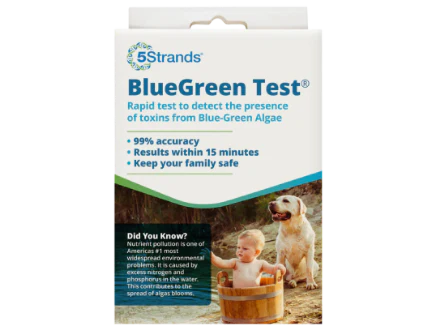If your dog is experiencing symptoms, like diarrhea, constant scratching, or excessive paw biting or licking, then I implore you to read this until the end.
Before I founded 5Strands, my dog Zeus kept having diarrhea every week.
It was a worst-case scenario at dog parks.
I’d be a horrible pet owner if I didn’t pick up after my dog in public, right?
So there I was—bag over my hand, fingers scraping through the grass, scooping up warm, gooey dog poop.
At the time I knew very little about dog health and thought it was due to stress, or maybe just a bug he caught and would get over.
I felt terrible and had no idea what to do.
I tried everything - grain-free kibble, high-end canned foods, and homemade chicken and rice. Visited multiple vet clinics for different opinions and they all prescribed expensive medications.

Nothing worked long-term.
One night, while scrolling through a health forum, I came across a post about food intolerances. It wasn’t something I’d ever considered.
I heard of gluten and lactose intolerances, but I never thought you could be intolerant to any specific food item.
Most vets talk about allergies, but true allergies are actually rare.
Food intolerances are far more common - and often overlooked.
They don’t trigger an immediate immune response like allergies, but they can develop into chronic issues if left unaddressed.

“Many pet parents assume it’s an allergy, but food intolerances don’t trigger the immune system the same way—yet they can be just as disruptive.”
— Dr. Jean Hofve, DVM, Holistic Veterinarian
I read that people and pets can lack the enzymes needed to break down specific foods.
And when that happens, their body pushes back with symptoms like skin issues, gut problems, low energy, and chronic inflammation.
There was no over-the-counter intolerance testing for dogs and cats at the time.
No easy way to figure out what Zeus couldn’t digest.
Fast-forward to today - day-after-day of picking up runny dog poo single-handedly inspired me to start 5Strands.
It gives pet owners an easy way to identify their pet’s food and environmental intolerances using a simple at-home hair test.
Our first test subject was Zeus! (Don’t worry. No animals were harmed. All that’s needed is fur from his brush!)
Turns out, my dog had quite a few food intolerances.
The results showed his body struggled to process things like lamb, wheat, and sweet potato, which were all in the “premium” kibble and treats I feed him every day.
So I made some dietary adjustments based on his results.
Three weeks later? The diarrhea was gone and I no longer had to rake my fingers through the grass in public places. Thank God!
It felt like his body had finally stopped fighting.
Unfortunately, most people in a similar situation don’t realize that “healthy” foods aren’t universal for every dog, and that even these ingredients can trigger symptoms.
According to the Purina Institute, up to 40% of dogs suffer from food intolerances, yet less than 1% of dog owners test for them.
It comes down to individual biology. Some pets just don’t have the gut biome they need to process certain foods.
And when you don’t know, you keep feeding them things that upset their gut.
Not because you’re careless, but because no one ever told you intolerances could be the problem.
It’s Not Just Gluten and Lactose
Everyone talks about gluten and dairy intolerances.
But what about fruits, grains, and vegetables?
These issues may develop silently behind the scenes, but discomfort symptoms can pop up if they’re left unaddressed.
What Intolerances Look Like
If you’ve ever said, “I don’t know what’s wrong with them,” try looking into their intolerances.

In a third-party CitrusLabs study for 5Strands, by Day 45:
-
81.25% of pets had no diarrhea.
-
65.63% had stopped vomiting.
-
62.5% had no upset stomachs.
As Dr. W. Jean Dodds puts it, "Food sensitivities and intolerances are increasingly recognized as significant contributors to chronic health issues in dogs, making reliable testing essential for accurate dietary management." (JAHVMA, Vol. 49, Winter 2017/2018).
What Testing with 5Strands Looks Like
No expensive vet visits, painful needles, or hidden fees.
You simply pluck a bit of fur, mail it in, and get clear results emailed back to you in just a few days.
In fact, 61.1% of pet parents in that same CitrusLabs study didn’t either.
And 100% said the instructions were easy to follow.
“Our vet couldn’t figure it out. 5Strands told us what foods to cut out. We saw results in a week.”
– Miguel R., California
Why Guessing Doesn’t Work
Even the expensive food can trigger issues. Formulas change. Labels shift. Ingredients hide behind vague names. “Hypoallergenic” doesn’t automatically mean it’s safe for your pet.
Guessing the solution wastes time and money. Testing helps you make informed, effective decisions.
“Food intolerances are about digestion, not immunity. They’re usually caused by a pet’s inability to properly break down certain ingredients.” — Dr. Jennifer Coates, DVM
Is Intolerance Testing Legit?
5Strands has tested over 300,000 pets across the country.
It’s the only test of its kind backed by a 3rd party test by Citrus Labs.
According to CitrusLabs:
-
81.3% of pet parents said they’d use it again.
-
68.8% would recommend it.
-
71.9% saw real improvements in their pet’s life.
It’s also gained popularity among holistic vets, breeders, and trainers.
No pills, medications, or fuss. Just actionable changes that allow your pet’s body to heal and rebalance naturally.
So What Now?
You’ve got three options:
Option 1: Do nothing, and your pup continues to suffer.
Option 2: Keep spending your precious time and money on trial-and-error fixes.
Option 3: Pinpoint the root cause of their symptoms and make intentional changes, because every dog deserves a healthy and comfortable life.
If you’ve read this far, you already know which one feels right.



























